Now that we know what to do with the poop on the diapers, we are ready to look at the actual washing routine!
Washing instructions for cleaning cloth diapers are not as different from washing clothes as you might think. Diapers are just soiled laundry! There are a few things you will want to consider when washing your diapers.
Type of Water
Sometimes when people have issues with diaper washing, it’s because their water is far too hard. Some people think the answer to this is having soft water, but soft water can cause a host of issues on its own if you don’t alter your routine to accommodate it.
The minerals and deposits in hard water can sometimes cause issues with odors and repelling (the liquid not soaking into the inserts properly). But when water is very soft, it can cause issues with suds and the detergent not rinsing out fully.
I recommend doing one of two things: test your water using test strips (can easily order online) to know if your water is hard or not, or you can bring a water sample to a pet store and ask them to test it for you. (To be honest, I never tested my water hardness before I started. I just chose to use Tide powder–it has softeners added that can cover up to 180 ppm, which is moderately hard water. If you would like to be certain you are doing things correctly or want to use liquid detergent, then testing is a great idea).
Many people add Calgon or Borax to their diaper laundry to soften the water. If this is what works for you, great, but do not over soften your water thinking that will avoid issues. I believe sometimes people get a little carried away with thinking their water hardness is an issue. Over softening your water is a bigger pain to deal with than a few hard water minerals.
The water you currently have in your home is probably just fine. 85{9994046f29331ee04cc0b5e07eb28364315ea03ccc2f01b5a43e8b85b372d1e9} of Americans have hard water, and no, 85{9994046f29331ee04cc0b5e07eb28364315ea03ccc2f01b5a43e8b85b372d1e9} of cloth diaper users do not have to treat their water when washing diapers.
I’m not trying to stress you out about your water, and I believe most people won’t have any issues with theirs. Just keep the idea of water softeners in the back of your head as you plan your routine, and consider if it may be a problem if you start to have issues.
When I washed my diapers in hard water, I used no softeners. This was a personal choice of mine and a million people will say I was wrong, but with 5 years washing in hard water and not dealing with any issues, I’ve chosen not to worry about it. 😉 You do you, though. Whatever you feel will work the best for your situation.
In my new home, our softener is pretty robust and our water hardness is zero. We definitely have more issues rinsing all the soap out now, and it’s so easy to accidentally overdo it on the detergent. Super soft water has required me to do more trial and error than my hard water did.
You can read more about navigating hard water with cloth diapers here.
Load Size and Water to Diaper Ratio
You will need to pay a little more attention to your load size than you maybe have for other loads of laundry. Your load size is dependent upon the size of your washer, but here are some general guidelines for a regular, non-HE washer:
Small Load: Around 10 diapers (or whatever number will fill your machine full about 1/3 of the way)
Medium Load: Around 12-14 diapers (or whatever will fill your machine about 1/2 of the way)
Large Load: 15+ diapers (or whatever amount makes your machine about 2/3 to 3/4 full–do not overstuff your washer)
As for the water to diaper ratio, you need enough water that they get plenty clean, but not so much that they don’t agitate or scrub against each other.
One temptation people have is to do a small or medium load with the washer set to use the amount of water needed for a large load. Please don’t do this! Not only is it a waste of water, but it actually won’t get your diapers as clean.
I know that seems counter-intuitive, but the most important factor in whether diapers get clean or not (assuming you use enough of a quality detergent) is if they agitated properly. They need enough water so that they get properly cleaned, but not so much that they float around and don’t agitate against each other.
Using the correct amount of water for your load size is essential.
A great analogy I heard many years ago is this: you want diaper stew, not diaper chili OR diaper soup! Think about the difference between stew, soup, and chili. Soup has lots of liquid and is much thinner than chili. Chili has less liquid and is very thick. Stew has some liquid, but the bulk of the recipe is the good stuff. That is what you want to aim for with your diapers.
What about HE Machines?
There is a myth going around that you can’t cloth diaper with a HE washer, and that is not true.
A HE machine can sometimes pose a challenge with getting enough water and agitation for your load to properly clean the diapers, but there are workarounds for this and most people do just fine. I started cloth diapering with a regular non-HE top loader, moved and used an HE front loader, and now have an HE top loader. I was able to get my diapers clean with all three, though the front loader gave me the most grief.
The trick is to make sure your load size is appropriate. Despite what people may tell you in cloth diaper groups on Facebook or elsewhere, there is no one-size-fits-all for load size. It’s not even one-size-fits-all for all top loaders, or for all front loaders. Each machine is unique, and your water hardness, detergent choice, etc all play a role. But in general, start with 1/2 full and tweak as necessary. Don’t be afraid of trial and error. You will not ruin your diapers.
Check out my tips for washing with a HE front loader here.
That said, I recommend you don’t overthink this. You will likely wash your diapers with no issue. If you do start to have issues getting them completely clean, at that point you can start to analyze and note take about your load size, detergent amounts, etc.
Detergent
There are many schools of thought about what laundry detergent is right for cloth diapers. Some diaper manufacturers also say in their washing instructions that you need to buy their detergent for best results. That simply isn’t true (and usually does more harm than good).
I personally preferred to buy detergent that was a bit more cost-effective and could be used on all of my clothes to keep things simple.
You can use almost any mainstream detergent on cloth diapers! There are just a couple guidelines you want to follow to protect the quality of your diapers.
- Do not buy detergents with fabric softeners (and do not use fabric softener on your diapers). Fabric softeners will negatively affect the absorbency of your diapers.
- Pick a laundry detergent, not a laundry soap. Laundry soaps can leave a residue that negatively impacts the absorbency.
- Avoid homemade detergents. The reason homemade detergents aren’t recommended is that most homemade detergent recipes are actually soaps, not detergents. Laundry soaps (as described in number 2) can be harmful to your diapers. Surfactants are necessary to clean diapers properly, and you can’t really make those at home.
Now I’m going to share with you what has worked for me for almost six years of continuous cloth diapering without a single issue.
Yep–just Tide Original Powder. It’s served me well.
Some other popular detergents that people have loved to use with their diapers are Tide Free & Gentle, Gain, All, All Free & Clear, Cheer….etc. Here are some tried and true recommended detergents.
If you have a HE machine, make sure you use a detergent meant for a HE machine.
I hope you are gathering from this that most detergents are okay! You may be able to use your current detergent as long as it meets the guidelines above.
As far as the amount of detergent you need to use: It will depend on your load size, but typically, somewhere between lines 2 & 3 for powder detergents, and a capful for liquid is what is appropriate to use for an average load size for a non-HE machine.
Some people feel that is too much detergent, but since we are dealing with soiled laundry, I prefer to use an appropriate amount.
What about green detergents?
Some green detergents work well for cloth diapers, but not all. Check out this post if you’re interested in finding a good quality, plant-based detergent.
It’s also important to note that you may need to use a little more detergent in your diaper loads than what a typical load would require. Plant-based detergents are just not as powerful as mainstream detergents.
My own experience with green detergents is that I was able to get them to work well in my regular washer, but now that I have a HE washer, I have struggled to get the same results. Be open to the idea that a green detergent may not work out, but feel free to try. Just don’t put all your eggs in that basket.
What about the Dryer?
Whether or not you use the dryer is up to you.
If you are using natural fiber diapers, I would dry without hesitation (unless you want to save energy!) If your diapers have an outer layer of PUL, you may consider hang drying or using the dryer on the delicate option/LOW heat. You do not want to use high heat on PUL as it may damage it.
I dry my diapers (most of them have PUL) on low and haven’t had an issue.
Simplified Step-by-Step Routine
If you would like to get a free printable PDF of a simple cloth diaper washing routine, click here to sign up for my mailing list!
I hope you have enjoyed this post on washing instructions for your cloth diapers! There is one more post in this series about cloth diaper accessories.
Leave a comment below–what are you still wondering about? Do you have your own routine you’d like to share?


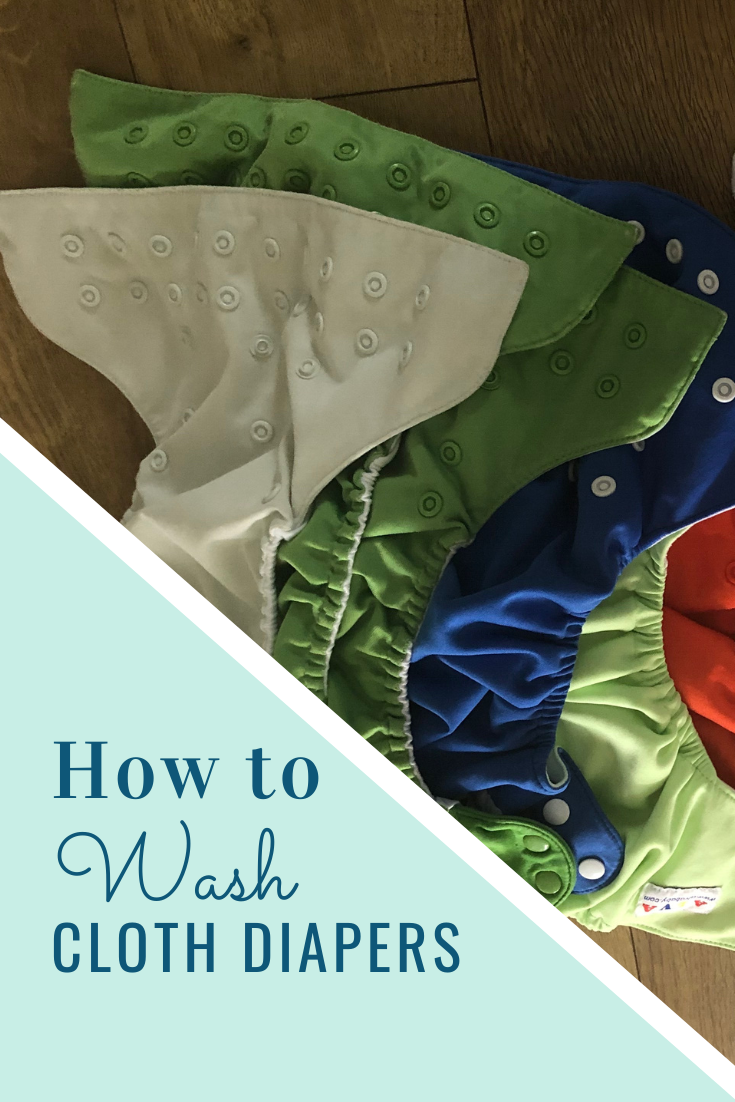
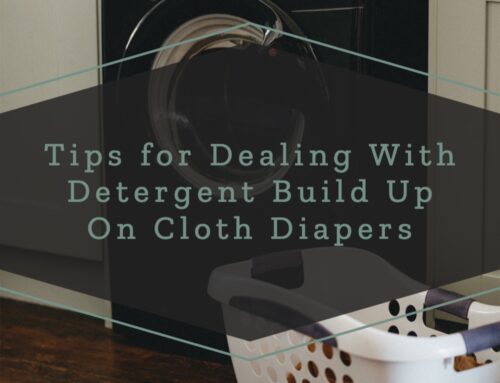
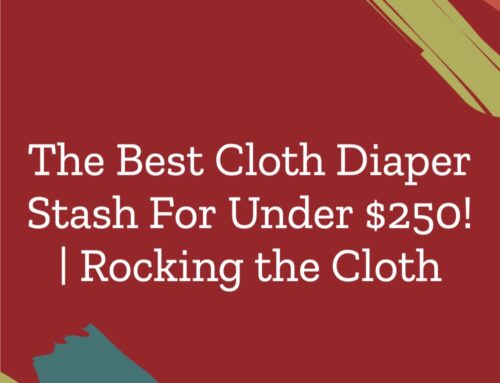
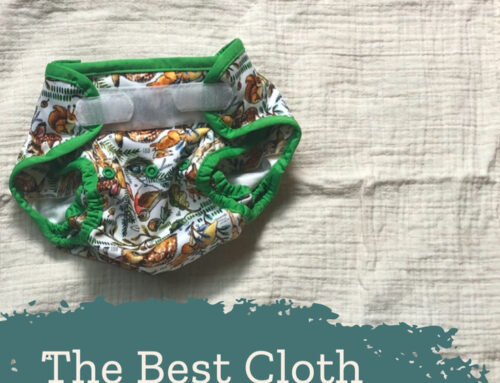
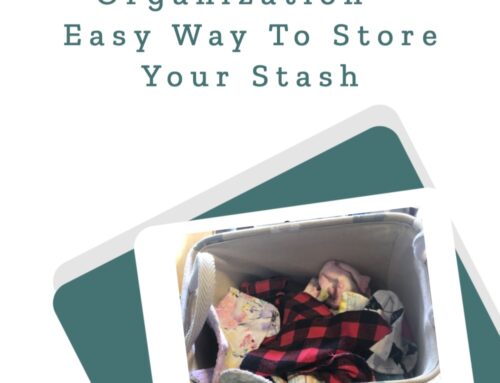
Hi Holly, Great information on how to wash cloth diapers. I am a big fan of using Tide, I am not sure the difference between a laundry soap and a laundry detergent? Do you mean a liquid versus a powder? I have learned a lot in this article, I am one who uses a full load of water to wash a small load, thinking it will come out cleaner. I will change my ways, after reading this. Thank you.
Hi Jenny! A soap vs. detergent is not necessarily liquid vs. powder–either liquid or powder can work great. The difference is in the ingredients. Soaps tend to leave a lot of residue due to the fats/oils in the product and don’t work up a good lather. The residue can prevent the diapers from absorbing the liquid, therefore causing leaks. Great question!
Hello Jenny, I really love your post and it was very informative. I have decided to put into practice the instructions that you have outline and see the result. Thank you so much for sharing this information.
Thanks, I hope it helps you out! -Holly
This is such a helpful and informative post, thank you. I’ve been thinking of making the move to cloth diapers for a while and washing was one of my concerns so your guide to cleaning them is really helpful. My other worry is whether they’re sufficently absorbent at night? My baby sleeps through in a decent night nappy. Do you find cloth ones as effective?
Hi Amy! Cloth diapers can work well at night with the right diaper/inserts. Fitteds are a great night option because they are one of the most absorbent diapers. You can also buy some ultra-absorbent inserts (like hemp or bamboo) to use specifically at night, double stuff them, etc.
Alternatively, lots of families will use cloth all day but then one disposable at night.
Hope that helps!
Hello!
I don’t have a baby … yet! however, you’ve noted things in this article that I haven’t even begun to think about! I would probably use cloth diapers, for a variety of reasons, one being for waste and recycling purposes, and two being cost efficiencies. Babies are expensive, and as I am sure you already know, cloth diapers seem to be the way to go!
But washing them! Oh boy, I hadn’t even considered the dreaded “washing” part. Things like the soap you use, and even right down to the type of water your household provides are efficient ways to wash these diapers that HAVE to be clean for next use. This is your baby after all, you want them clean and fresh!
Thank you for all the information!
Hi Alanna! Yes, the washing part scares a lot of people off, but it really doesn’t have to be more complicated than a regular load of laundry! 🙂 As long as your detergent is free of fabric softeners (so no “added Downy!” on the package or anything), it’s probably fine to use. I just do a rinse, hot wash with detergent (usually line 2), and extra rinse at the end. Hope that helps!
Holly,
Great tips on making diapers come out of the wash clean and ready for the bottom. We always had to rinse them out before putting in the bucket. We always hung them up to dry on a line, either inside or outside to dry. Outside was always better as the wind would make them very soft and easy to fold.
John
I love drying clothes out in the fresh air. So soft and fresh!